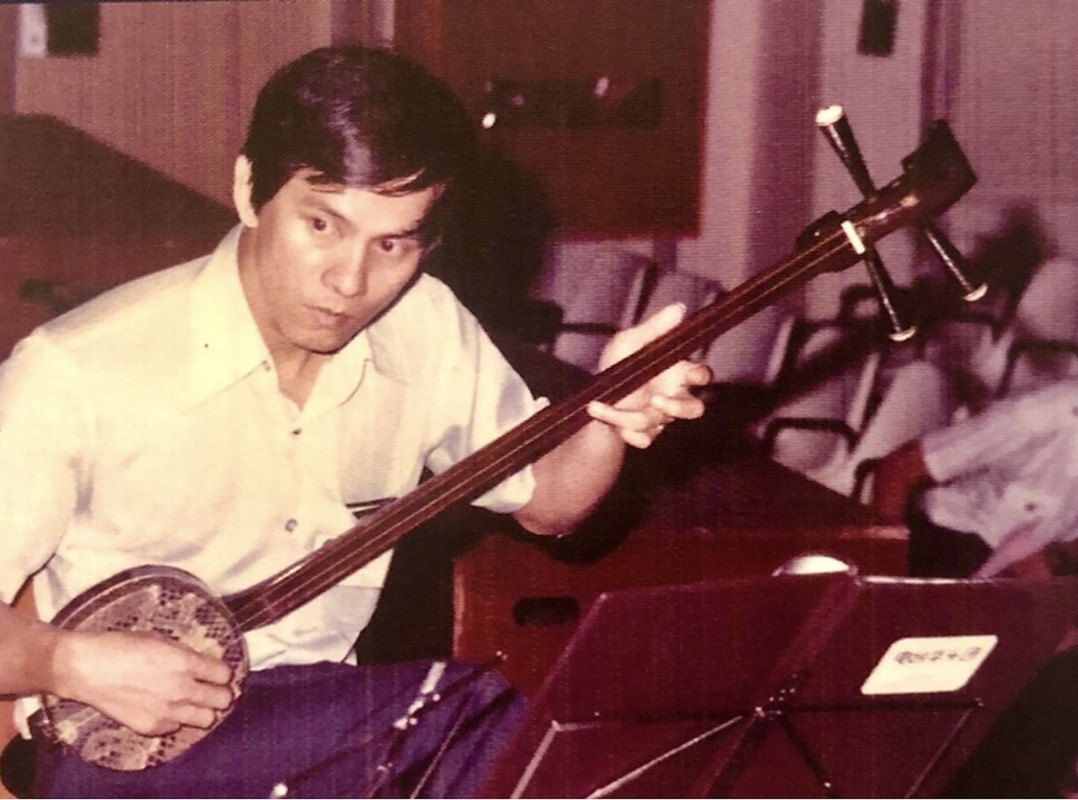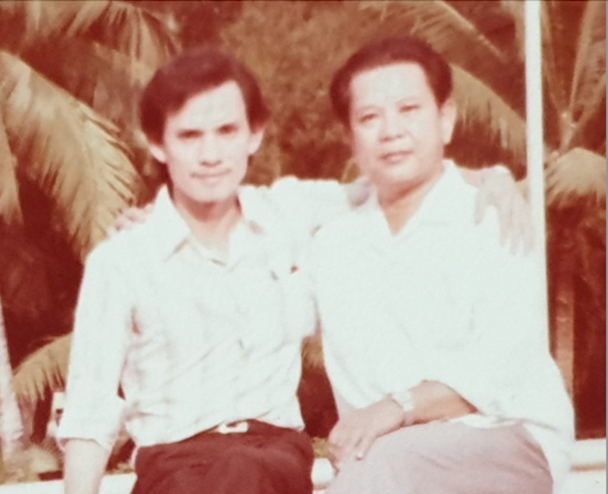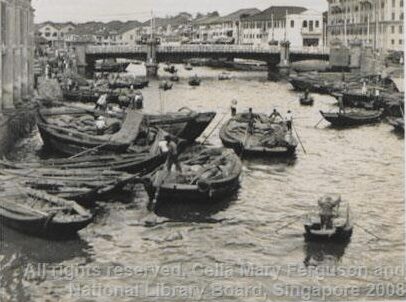Pioneer musician: Leong Yoon Pin
Leong Yoon Pin (1931– 2011) was a respected composer, conductor and educator who is regarded as the “Father of Singaporean Composers”.1
Education and teaching career
Born in Singapore, he finished schooling at Saint Patrick’s School in 1949, after receiving a mix of English and Chinese-language education. He taught himself to play the piano at 16, and the guitar at 17.2He went on to study at the Teachers’ Training College from 1951 to 1953. Upon graduation, he taught music and singing in five primary schools. The regular income from his job allowed him to take formal piano lessons with South African concert pianist Noreen Stokes (1917–2012). He also won a scholarship to study the bassoon with Fred Krempl (birth and death years unknown). In between teaching and receiving musical instruction, he found the time to sing with the Singapore Music Society Choir.3
In 1955, Leong received a scholarship from Singapore’s Education Department (the precursor of the Ministry of Education) and travelled to London’s Guildhall School of Music and Drama, where he majored in composition.4He graduated in 1958, and upon his return to Singapore, joined the Teachers’ Training College as a music lecturer. During this period, he became involved in the musical activities of the Metro Philharmonic Society.5

In 1966, Leong received a scholarship from the French government and went to study with Nadia Boulanger (1887–1979) in France for two years. Boulanger was one of the most influential teachers of the 20th century, and had taught a number of prominent composers of the time, such as Grażyna Bacewicz Biernacka (1909–1969), Lennox Berkeley (1903–1989), Elliott Carter (1908–2012) and Aaron Copland (1900–1990). She encouraged Leong to draw from the music of his own background and create his own distinctive voice.6
After his return, he carried on with his teaching job at the Teachers’ Training College and was eventually appointed Head of its Music Department in 1971. By that time, the college had been renamed the Institute of Education. Leong was still active in the musical scene, and was subsequently appointed Resident Conductor of Singapore’s National Theatre Orchestra.7In 1975, he won a British Council Fellowship and went for postgraduate studies in Music Education at the University of Newcastle-upon-Tyne.8Then, in 1982, he was awarded the Cultural Medallion, the highest cultural award in Singapore, for his contributions to Singapore’s musical development.9
In his later years, Leong served as a director of the then-Singapore Youth Orchestra (now Singapore National Youth Orchestra), and was instrumental in establishing the Music Department of the Nanyang Academy of Fine Arts.
Seminal compositions
In the 1950s, Leong founded the Rediffusion Youth Choir (1953) and the then Metropolitan Philharmonic Choir (1959, now Metro Philharmonic Society) — and started composing for them. The compositions were born out of necessity, because there were very few locally-written songs for the choirs to sing.10These choral pieces were sung in Mandarin, and some of the more notable pieces were Dang baihua shengkai (When a Hundred Flowers Blossom) and Zao an ah, malaiya (Good Morning, Malaya). Many of these choral pieces used lyrics written by notable local Chinese literati.11Although the melodies had a Chinese style, they were given a modern and refreshing treatment. This modern treatment of Chinese choral pieces became a distinguishing feature of his choral works.
Leong’s work developed over the years and reflected unique aspects of Singaporean society. Wulong (Dragon Dance), commissioned by the then Singapore Broadcasting Corporation Choir in 1988, was a choral work filled with vocal imitations of the sounds of the drums at a dragon dance. This was a work which transcended language, and could be enjoyed by anyone in Singapore. Jietou xiangwei (Street Calls), commissioned in 1997 by the Ministry of Education for its Youth Festival, was a choral work using text consisting only of the names of local hawker food. Xiyang (Sunset), another Youth Festival choral commission in 2005, had a text consisting of all four of Singapore’s official languages.12A commission by the Singapore Youth Choir in 1988 led to E meng (Nightmare), with English lyrics by Singaporean writer Angeline Yap. Besides composing choral music, Leong wrote chamber music for various chamber ensembles as well as large-scale orchestral works. When the Singapore Symphony Orchestra (SSO) debuted in 1979 as Singapore’s first professional orchestra, Leong — who had already composed two symphonies by then — was quickly commissioned to write a piece for them. A year later, in 1980, the SSO premiered his Dayong Sampan Overture, which drew on a well-known Malay folk song. A decade later, Leong composed Daybreak and Sunrise for wind band for the Ministry of Education’s 1992 Singapore Youth Festival Indoor Band Central Judging. This opened up his music to a new generation of wind players.

Leong also has the distinction of being the first Singaporean to compose an opera written in English. Titled Bunga Mawar, it was commissioned by the Singapore Lyric Opera and premiered in 1997. The English libretto was written by prominent Singaporean writer Edwin Thumboo, and the story tells of two ill-fated lovers from different Peranakan families.
Leong’s compositions span several decades, and include a wide variety of vocal and instrumental ensembles. His harmonic vocabulary and musical treatment of his chosen subjects paralleled the developments in Singapore’s musical and cultural history. Any Singaporean involved in the music scene as a performer, student, composer, music director, or audience member would have at some point come into contact with Leong’s musical direction or teaching, rehearsed and performed his music, or perhaps just listened to one of his myriad compositions.
Leong died on 11 April 2011. His legacy lives on in the Leong Yoon Pin Music Fund, which was created after his death to support music students at the Nanyang Academy of Fine Arts.13
| 1 | “Leong Yoon Pin”, Esplanade Offstage, 12 October 2016. |
| 2 | Eleanor Tan, “Leong Yoon Pin”, Singapore Infopedia. |
| 3 | Albert Tay, “Leong Yoon Pin and His Choral Music: Singapore’s Choral Legacy”, 57. |
| 4 | “Leong Yoon Pin”, Singapore Infopedia. |
| 5 | “Leong Yoon Pin and His Choral Music: Singapore’s Choral Legacy”, 58. |
| 6 | Kong Kam Yoke, “Leong Yoon Pin: the Shy Composer”, National Library Board, Singapore. |
| 7 | “Leong Yoon Pin and His Choral Music: Singapore’s Choral Legacy”, 59. |
| 8 | “Leong Yoon Pin”, Singapore Infopedia. |
| 9 | “Leong Yoon Pin”, Singapore Infopedia. |
| 10 | Chia Wei Khuan, “Xinjiapo de huawen hechang huodong” [The activities of Chinese chorus in Singapore]. |
| 11 | Albert Tay, “Leong Yoon Pin and His Choral Music Singapore’s choral legacy”, Appendix A. The lyricists listed include many prominent published local Chinese writers. |
| 12 | Gavin Lee, “Yoon-Pin Leong”, in Scions of the Musical West: Singapore at Cultural Crossroads, 126–128. |
| 13 | A sum of $500,000 was donated by Leong’s family to set up the fund. There were also donations of his scores to the National University of Singapore, and music books to the Nanyang Academy of Fine Arts library. |
Chia, Wei Khuan. “Xinjiapo de huawen hechang huodong” [The activities of Chinese chorus in Singapore]. Fujian Yishu [Fujian Arts] 5 (2006): 50–51. | |
Kong, Kam Yoke. “Leong Yoon Pin: The Shy Composer”. National Library Board, Singapore. | |
Lee, Gavin. “Yoon-Pin Leong”. In Scions of the Musical West: Singapore at Cultural Crossroads. Singapore: Gavin Lee, 2009. | |
Tan, Eleanor. “Leong Yoon Pin”. Singapore Infopedia, National Library Board. | |
Tay, Albert. “Leong Yoon Pin and His Choral Music: Singapore’s Choral Legacy”. Bachelor’s diss., Nanyang Academy of Fine Arts, 2006. |










